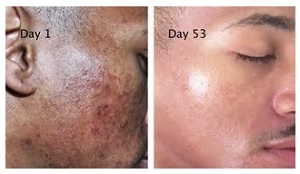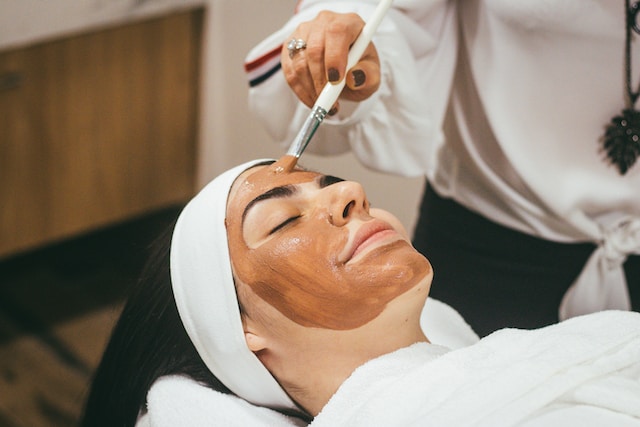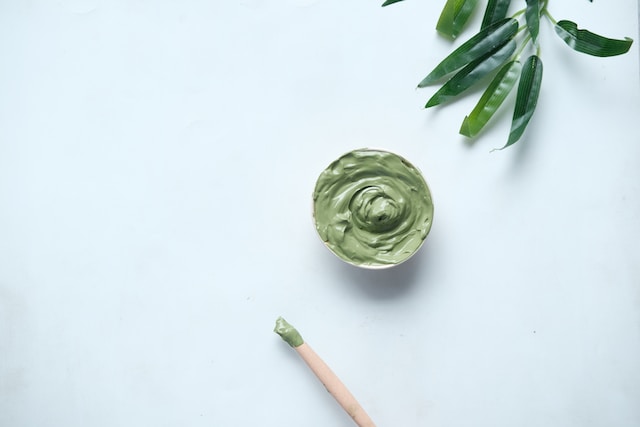Skin brightening focuses on achieving a radiant glow by removing dead skin cells and improving overall complexion, whereas skin lightening aims to lighten the skin tone by reducing melanin production. It is important to note that there are pros and cons to each method, as well as potential risks associated with certain ingredients used in these products. It is always advised to consult with a dermatologist before trying any new skincare routine or product.
Skin Lightening
(Photo By Kylie Aquino on Flickr)

Skin lightening is the process of reducing melanin production in the skin. Melanin is a pigment that gives color to our skin, hair, and eyes. Skin lightening products work by inhibiting an enzyme called tyrosinase which is responsible for producing melanin. This leads to a reduction in pigmentation and a lighter overall complexion.
While many people use skin lightening products to treat hyperpigmentation caused by acne scars or sun damage, others use them as a way of achieving fairer skin tones. However, it’s important to note that excessive use of these products can be harmful and may result in adverse effects such as thinning of the skin or increased sensitivity to sunlight.
Common ingredients used in skin lightening products include hydroquinone, kojic acid, vitamin C, alpha-arbutin, and licorice root extract. It’s essential to choose reputable brands with safe formulations when using these types of products.
While there are benefits to using skin lightening treatments for specific concerns such as hyperpigmentation; it’s essential not to overuse these treatments or view them as a means of achieving unrealistic beauty standards.
Skin Brightening
(Photo by Raphael Lovaski on Unsplash )

Skin brightening is a term that refers to the process of improving the overall appearance and glow of your skin. It works by eliminating dullness, uneven skin tone, dark spots, and other imperfections caused by sun damage or aging. In contrast to skin lightening, which aims to lighten the natural color of your skin, brightening treatments work on enhancing its radiance.
There are many ways to brighten your skin naturally without using harsh chemicals or undergoing invasive procedures. Some popular options include exfoliating regularly with gentle scrubs or chemical peels, applying vitamin C-rich serums or creams to boost collagen production and improve hyperpigmentation issues. Incorporating antioxidants like green tea extract can also help protect against free radicals that cause oxidative stress.
One benefit of going for a brighter complexion is that you can achieve noticeable results in as little as one week after beginning treatment! However, it’s important to note that everyone’s skin reacts differently depending on their unique needs and lifestyle habits such as diet and exercise routine.
If you’re interested in trying out some at-home remedies for brighter-looking skin but don’t know where to start- there are plenty of resources online including blogs like this one! Many people find success testing different products until they find what works best for them – so don’t be afraid if it takes some trial-and-error before seeing desired outcomes!
Skin Lightening Vs. Skin Brightening – Key differences
Skin lightening and skin brightening are two terms that are often used interchangeably, but they actually have different meanings. Skin lightening refers to the process of reducing melanin production in the skin, which can result in a lighter complexion. On the other hand, skin brightening refers to improving overall skin tone by targeting dark spots, uneven texture or dullness.
The main difference between these two processes lies in their purpose- while skin lighteners aim to lighten overall complexion; brighteners focus more on addressing specific concerns like hyperpigmentation or discoloration caused by sun damage or aging.
Another key difference is that while some ingredients used for skin lightening like hydroquinone can be harmful when overused or misused; most of those used for brightening such as vitamin C and kojic acid are safe and gentle enough for daily use.
Pros and Cons of Skin Brightening
Skin brightening has become a popular trend in the beauty industry recently. While there are many benefits to achieving a brighter complexion, it is important to weigh the pros and cons before deciding whether or not to pursue skin brightening treatments.
Pros of Skin Brightening:
One of the biggest advantages of skin brightening is that it can help reduce dark spots, hyperpigmentation, and uneven skin tone. This can result in an overall brighter and more radiant complexion. Additionally, regular use of skin-brightening products may also improve your skin’s texture and firmness.
Cons of Skin Brightening:
However, it is important to note that some methods of skin brightening can be harmful if not done correctly or with caution. Certain ingredients commonly found in skincare products such as hydroquinone or kojic acid have been linked to potential side effects like redness, irritation or even permanent damage when used incorrectly.
How long does It take?
It’s worth noting that results from using safe lighteners often take time – anywhere from several weeks up to three months for noticeable improvements depending on the product formulation and individual’s response rate.
Before trying any new skincare regimen aimed at improving your complexion through brighteners ensure you do your research first so you can make informed decisions about what works best based on your unique needs!
Pros and Cons of Skin Lightening
Skin lightening has been a controversial topic in recent years. While some people use it to treat skin conditions like hyperpigmentation and acne scars, others use it to achieve a lighter complexion. Here are some of the pros and cons of skin lightening.
Pros of Skin Lightening
- Skin lightening can improve the appearance of dark spots, uneven skin tone, and blemishes.
- It can boost your confidence and self-esteem if you’re unhappy with your current complexion.
- Certain ingredients used in skin-lightening products like vitamin C and glycolic acid have anti-aging benefits.
Cons of Skin Lightning
- Some skin-lightening products contain harmful chemicals like hydroquinone that can cause adverse side effects such as burning, itching, or redness.
- Prolonged use of certain products may lead to thinning of the skin or increased sensitivity to sunlight.
- There’s also a risk that using these products excessively could damage your natural melanin production.
Ultimately, whether you choose to lighten your skin is a personal decision. However, it is important to weigh up the potential risks against any perceived benefits before deciding on which route to take.
What lightens and brightens skin?
There are several natural ingredients and products that can both lighten and brighten the skin. One of the most popular is vitamin C, which has antioxidant properties that help to reduce dark spots and promote an even complexion.
Another powerful ingredient is kojic acid, which is derived from rice fermentation. It works by inhibiting melanin production in the skin, resulting in a brighter and more radiant complexion.
Licorice extract is also known for its skin lightening properties as it contains glabridin, a compound that helps to inhibit tyrosinase activity – an enzyme responsible for melanin production.
Arbutin, found in bearberry extract, functions similarly to hydroquinone but without the harsh side effects. It’s effective at reducing hyperpigmentation while promoting a brighter complexion.
Other natural ingredients such as turmeric, papaya enzymes, and alpha-hydroxy acids (AHAs) can also aid in brightening dull or uneven skin tone. However, it’s important to always patch test any new product or ingredient before adding it into your skincare routine.
How long does skin brightening take?
Skin brightening is a gradual process and cannot be achieved overnight. The duration of skin brightening depends on various factors, such as the extent of hyperpigmentation or sun damage, the individual’s skin type and sensitivity, and the products used for treatment.
Generally, it takes at least 4-6 weeks to see noticeable results in skin brightness when using topical treatments such as serums or creams. But more severe cases may take up to three months before visible effects are shown.
For individuals undergoing professional treatments like chemical peels or laser therapy, multiple sessions over several weeks may be required for optimal results.
It is essential not to rush the process by overusing products that contain harsh chemicals that could harm your skin instead of helping you achieve your desired result. It is important to follow a consistent skincare routine with gentle exfoliation and hydration while using brightening agents to help get faster results without causing any damage.
In summary, patience is key when aiming for brighter-looking skin as it varies from person to person depending on their specific needs and goals. Stick with a healthy skincare regimen that works best for you until you reach your desired outcome.
Featured Image By – Towfiqu barbhuiya on Unsplash








